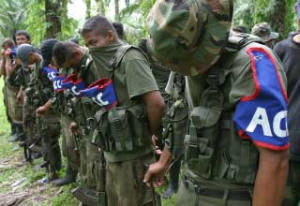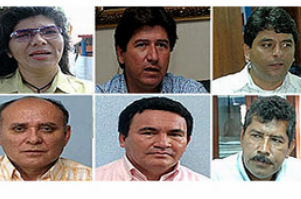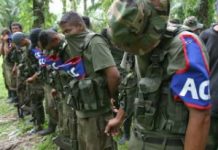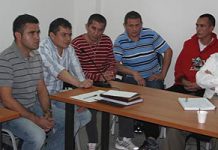A lieutent of ´Martín Llanos´ told how the group extorted petroleum and palm oil. He also confessed to the murder of two people whom the Army classified to be “paras” killed in combat.
 The Peasant Self-Defense of Casanare (ACC), acting under the command of ´Martín Llanos,´ never demobilized, making it difficult to reconstruct the group´s history. Photo: Semana ArchiveIn a hearing in the Justice and Peace process, Rafael Antonio Saénz Chaparro (alias ´El Diablo,´ or ´The Devil´), who was a member of the Peasant Self-Defense of Casanare (ACC), told of his participation in the extortion of businesses of palm oil, petroleum, rice and chanceras.
The Peasant Self-Defense of Casanare (ACC), acting under the command of ´Martín Llanos,´ never demobilized, making it difficult to reconstruct the group´s history. Photo: Semana ArchiveIn a hearing in the Justice and Peace process, Rafael Antonio Saénz Chaparro (alias ´El Diablo,´ or ´The Devil´), who was a member of the Peasant Self-Defense of Casanare (ACC), told of his participation in the extortion of businesses of palm oil, petroleum, rice and chanceras.
´The Devil´ described how he managed relations with members of the Battalion of the 28th Infantry of the Army, based in La Mesa, Cudinamarca, with whom the ACC coordinated the murder of two street vendors the Attorney General identified as Alfredo Castañeda and Alonso Rincón, who were presented by the army as paramilitaries killed in combat.
Although the criminal history of Sáenz Chaparro included actions in Casanare, Boyacá and Cudinamarca, his principal zones of influence were Fusagasugá, Mesitas del Colegio, La Mesa, Viota´and Sogamoso.
In these municipalities situated a few hours from Bogotá, ´The Devil´ was the director of finance and charged with managing relations with the region´s Armed Forces.
´The Devil´ demobilized as a patrolman of the Centauros Block, but the majority of his crimes were comitted with the ACC, a group to which he belonged from August 1997 to Oct. 5, 2003, when he was captured by the Centauros Block and obligated by threats, as he testified, to change his paramilitary group.
Originally from Tauramena, Casanare, Saénz Chaparro is one of seven in the Justice and Peace process who was a part of the ACC, commanded by Héctor Germán Buitrago (alias ´Martín Llanos´), who is currently being held in the Maximum Security Prison La Picota de Bogotá.
As the Peasant Self-Defense of Casanare never demobilized, the testimony of ´The Devil´ is one of the few records the Attorney General has to reconstruct the history of a group , which, according to information gained during the Justice and Peace Process, left nearly 10 thousand victims in the states of Casanare, Meta, Boyacá and Cudinamarca.
From Escort to Director of Finances These politicans were investigated for parapolitics for their involvement with the “Casanare Pact. From right to left: Aleyder Castañeda, Leonel Torres, Mauricio Chaparro, Henry Montes, Jorge López y Raúl Cabrera. Photo montage: VerdadAbierta.comOn Aug. 18, 1997 Sáenz Chaparro began his life as an ACC member as a patrollman of a counter-guerrilla group in the region of Aguazul, Casanare. After a car accident left him disabled in 2000, he became part of the group´s intelligence in Villanueva, Casanare, under the command of the alias ´Galeano,´ whose identity is unknown.
These politicans were investigated for parapolitics for their involvement with the “Casanare Pact. From right to left: Aleyder Castañeda, Leonel Torres, Mauricio Chaparro, Henry Montes, Jorge López y Raúl Cabrera. Photo montage: VerdadAbierta.comOn Aug. 18, 1997 Sáenz Chaparro began his life as an ACC member as a patrollman of a counter-guerrilla group in the region of Aguazul, Casanare. After a car accident left him disabled in 2000, he became part of the group´s intelligence in Villanueva, Casanare, under the command of the alias ´Galeano,´ whose identity is unknown.
In 2002 ´The Devil´ became the escort to Jairo Melgarejo (alias ´28´), the director of finances of the Peasant Self-Defense of Casanare who was key to the group´s extortions. He is currently a fugitive from justice.
With ´28,´ Saénz Chaparro witnessed the meetings between the region´s mayors and the ACC of ´Martín Llanos´ in which they agreed upon financing the paramilitary groups and the forms in which taxes were levied on businesses in the region. ´The Devil´ named several politicans in Casanare who are currently incarcerated.
“Raúl Cabrera, who was very good friends with ´28,´ asked for help from the ACC to become the mayor of Villanueva in 2003 in exchange for 10% of the value of the contracts that were administered,” he said.
Cabrera was sentenced to six and a half years in prison for parapolitics along with five other mayors in the region, for signing the document known as the “Casanare Pact.”
In the pact, those running for mayor agreed to give the ACC 50% of the city budget and 10% of the value of the contracts that their administrations made.
Jorge Eliécer López Barreto, Henry Montes Montes, Mauricio Esteban Chaparro and Aleyder Castañeda — the former mayors of Tauramena, Maní, Sabanalarga and Monterrey, respectively — were also convicted.
Sáenz Chaparro also identified Miguel Ángel Pérez, the former governor of Casanare, who was sentenced to six years in prison by the Supreme Court after a video was released of him receiving $500 million pesos for his 2003 campaign from the hands of Luis Martín Sacristán (alias ´Fox´), an emissary of ´Llanos.´
During the same time, as the escort to ´28,´ The Devil participated in the collection of taxes from certain businesses in the region.
“In addition to the collection of 10% of the contracts of the government and the mayors, we financed commercial vaccines, bus companies and farmers. We even had customs checkpoints in which trucks had to pay based on the number of cattle they brought,” he said. “We had agreements with businesses such as Oil of Casanare and Eastern Oil (both located in Villanueva) and petroleum companies such as BP (British Petroleum) in Cusiana, Tauramena, which would provide $200 million pesos annually.”
´The Devil´ approaches Bogotá
The cities of Fusagasugá, Mesitas del Colegio, La Mesa and Viotá, known as the quintessential tourist destinations for those living in Bogotá, were the target of a paramilitary raid by the ACC under the command of ´Martín Llanos´ at the end of the 1990s and beginning of the 2000s.
In January 2003, Sáenz Chaparro was sent to Fusagasugá, Cudinamarca to take over the role as second-in-command of finances under Ángel Rodrigo Daza (alias ´Cascarón,´ or ´Shell´), currently imprisoned.
He said that upon venturing into the state a system of extortions was established with the region´s farmers, the gasoline stations Chinauta and Silvania and holiday villas, which had to pay an annual tax to the Peasant Self-Defense of Casanare.
In March 2003, Sáenz Chaparro was arrested after attempting to extort the owner of a summer home.
After being freed on April 29, 2003, The Devil was sent to Mesitas del Colegio and Viotá as the director of finances and put in charge of relations with the Armed Forces.
“We met in an ice cream shop in Mesita del Colegio,” he said. “The idea was to talk with the commanders of the station and the batallion so that ´Las Especiales´ (the armed paramilitaries in the zone) could carry out their task of social cleansing without problems.”
From then on, colonel Rodrigo Alfonso González and captain Édgar Mauricio Arbeláez Sánchez were in charge of Battalion 28 in the region of La Mesa, Cudinamarca, where Operation Freedom One began, with the objective to combat the guerrillas in the south of the country.
According to the testimony of Sáenz Chaparro, the group coordinated its operations with the two soldiers so that the ACC could mobilize throughout the area. “They gave the order to lift the checkpoints when we were passing through the roads,” he said, adding that the Self-Defense of Casanare vied for military contacts with the Capital Block.
“They offered $4 million pesos per month to Colonel Rodrigo González for his collaboration, but as he needed money to complete construction on a hosue in Bogotá, he asked for $60 million pesos up front and a ´salary´ of $10 million per month,” Sáenz Chaparro said.
Despite the competition with the Capital Block to have the greatest number of contacts with the Armed Forces, however, the ACC relied on the collaboration with members of Battalion 28, especially colonel González and captain Arbeláez, with whom they established a relationship that facilitated paramilitary actions in Cudinamarca.
According to a statement of the Lawyers Collective published in 2003, which denounced the outrages committed against civilians by the paramilitaries of ´Martín Llanos´ in the region of Viotá, colonel Rodriguez and captain Arbeláez were held responsible by default for the majority of the cases of murder, disappearance and forced displacement that occurred at the beginning of 2003.
“The population was complaining because the Armed Forces weren´t attacking the paramiltiaries although they were aware of their presence,” The Devil said. To conceal the coexistence of paramilitaries and the Armed Forces, they decided to kidnap two men in Fusagasugá, murder them and disguise them as paramilitaries in order to pass them off as having been killed in combat.
In June 2003 there were reports of a supposed clashbetween two members of the 28th Battalion and the ACC paramilitaries, in which two paramilitary deaths were reported.
En junio de 2003 se tuvo noticia de un supuesto enfrentamiento entre los hombres del batallón 28 y los paramilitares de las ACC, en el que se reportaron dos muertos de las autodefensas. However, investigations by the Attorney General established that the victims identified as Alfredo Castañeda and Alonso Rincón were street vendors from Fusagasugá who were deceived by Ágapo Gamboa Daza (alias ´Cesar´), boss of ´Las Especiales´ of the ACC and identified as false positives by the 28th Battalion.
According to information from the magazine Semana, the Attorney General ordered an indictment and arrest warrant against Colonel Rodrigo González, Major Alexander Lizarazo Parra and Major Alejandro Robayo for their links with the Peasant Self-Defense of Casanare and for the crimes of homicide, forced displacement, forced disappearance and kidnapping, among others. González is currently a fugitive. In 2008 the Public Prosecutor dismissed and disqualified captain Arbeláez for 20 years of service, “for committing violations of International Humanitarian Law against protected persons, as embodied in homicides, forced disappearances, torture, cruel, inhuman and degrading treatment and forced displacement.” A judge sentenced captain Édgar Mauricio Arbeláez to 34 years in prison for the homicide of a peasant in Viotá.
According to the Public Prosecutor, “the failure in their function is seen in the lack of results against the illegal group stationed in the region, the absence of effective actions to protect the community and the numerous violent events that occurred.”
After participating in these events that terrorized Cudinamarca, ´The Devil´ was sent to Sogamoso where he continued directing relations with the Armed Forces.
He was later taken to Santa Rosa de Ubalá, Cudinamarca, where he was captured by the Centauros and forced to become a part of the paramilitary group, where he served as the patrollman for the squad of ´Maravilla,´ or ´Wonder,´ who remains unidentified.
´The Devil´ faces a charge in the Second Circuit Court of Ibagué, Tolima for the crime of trafficking, manufacturing and possession of drugs. As the crime was committed after his demobilization, ´The Devil´ might be excluded from the benefits of the Justice and Peace process, and his case might be passed to the regular justice system.










